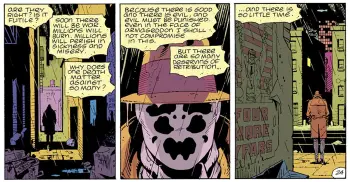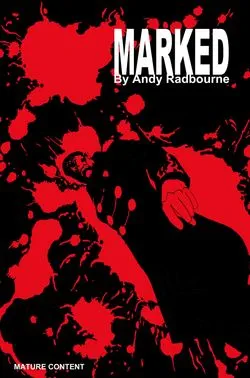⠪
Rorschach is he really a HERO...
Published: 04th February 2024, by Andrew Radbourne.
My musings on the debate over Rorschach being the hero of Watchmen following Literature Devils.
Greetings everyone,
Today, we explore a conversation highlighted to me by a video created by Jon Del Arroz. A spirited discussion focused on the epic tale of Watchmen, specifically on the character Rorschach in Alan Moore's monumental work. Jon's intriguing video was a response to a post by Literature Devil (see picture) on the turbulent subject of this controversial character, and the reactions he spurred on Twix, with critics hurling their moral grenades from the safety of their ideological fortresses.
Here, we delve into a brief overview of the origin of this heated debate. Watchmen, a sweeping visual saga that imbued superheroes with a newfound realism, was published between 1986 and 1987. Its narrative intertwines the lives of several mostly retired heroes as they grapple with their identities and a creeping conspiracy, all under the shadow of potential global destruction. The tale's core is often told from the perspective of the character in focus here: Rorschach.
Rorschach, an intriguing and broken character, viewed the world through a lens of uncompromised moral rigidity. He views the world in extremes of black and white, good and evil, and enforces that dogma with brutality.
Despite Moore's assessment that Rorschach was a 'repulsive' character, many readers found themselves drawn to his unwavering determination and moral firmness.
Literature Devil argues that the primary allure of Rorschach lies in his steadfast refusal to compromise, even in the face of Armageddon. This conviction is tested when the heroes discover that their former compatriot, Ozymandias, was behind the conspiracy. A stratagem that claimed millions of lives to stop global destruction and unite humanity against a common enemy.
The choice facing Rorschach and his companions becomes morally complex - expose Ozymandias and potentially spark global annihilation or remain silent and allow him to escape justice, thereby saving humanity. In this defining moment, Rorschach chooses not to compromise, even at the cost of his own life.
But does this pivotal decision make Rorschach a hero? His acts throughout the story have been brutal and driven by a personal vendetta against evildoers, often disregarding their humanity. We glimpse the harsh consequences of his actions when he tortures innocents and persecutes former villains without remorse. His struggle painfully mirrors a famous cautionary philosophical sentiment:
"When fighting monsters, beware not to become a monster yourself."
Moreover, his moral dogma, despite appearing black and white, displays shades of grey. This is evident when Rorschach overlooks the attempted rape by one of his respected comrades, the Comedian, and terms it merely as a 'moral lapse.' Rorschach, in essence, shares more common ground with Ozymandias than he may accept. Both characters are willing to perpetrate terrible acts if they believe they are justified to achieve their objectives, with only their scale of operation and perception of evil differing.
So, we circle back to the core question: who is the real hero? The ones who carry the burdensome secret to save billions or the one who dies defending an uncompromising truth? The former's quiet sacrifice saves the world, albeit with guilt and compromise. The latter's refusal to accept the world's narrative, even if it meant annihilation, points towards a certain heroic grit, but a grit born maybe more from a twisted morality or a stubborn dogma than outright heroism.
As such, the narrative of Watchmen, along with the philosophical quandaries it posits, remains a masterpiece, a cautionary tale exhorting us to examine our beliefs, heroes, and monsters closely. In this examination, it asks us: given a moment fraught with dire consequences, what choice would we make? And ultimately, does the means matter more than the end, or is it the other way around?
So, faced with the same quandary, without condoning or condemning, what would you do?
Today, we explore a conversation highlighted to me by a video created by Jon Del Arroz. A spirited discussion focused on the epic tale of Watchmen, specifically on the character Rorschach in Alan Moore's monumental work. Jon's intriguing video was a response to a post by Literature Devil (see picture) on the turbulent subject of this controversial character, and the reactions he spurred on Twix, with critics hurling their moral grenades from the safety of their ideological fortresses.
Here, we delve into a brief overview of the origin of this heated debate. Watchmen, a sweeping visual saga that imbued superheroes with a newfound realism, was published between 1986 and 1987. Its narrative intertwines the lives of several mostly retired heroes as they grapple with their identities and a creeping conspiracy, all under the shadow of potential global destruction. The tale's core is often told from the perspective of the character in focus here: Rorschach.
Rorschach, an intriguing and broken character, viewed the world through a lens of uncompromised moral rigidity. He views the world in extremes of black and white, good and evil, and enforces that dogma with brutality.
Despite Moore's assessment that Rorschach was a 'repulsive' character, many readers found themselves drawn to his unwavering determination and moral firmness.
Literature Devil argues that the primary allure of Rorschach lies in his steadfast refusal to compromise, even in the face of Armageddon. This conviction is tested when the heroes discover that their former compatriot, Ozymandias, was behind the conspiracy. A stratagem that claimed millions of lives to stop global destruction and unite humanity against a common enemy.
The choice facing Rorschach and his companions becomes morally complex - expose Ozymandias and potentially spark global annihilation or remain silent and allow him to escape justice, thereby saving humanity. In this defining moment, Rorschach chooses not to compromise, even at the cost of his own life.
But does this pivotal decision make Rorschach a hero? His acts throughout the story have been brutal and driven by a personal vendetta against evildoers, often disregarding their humanity. We glimpse the harsh consequences of his actions when he tortures innocents and persecutes former villains without remorse. His struggle painfully mirrors a famous cautionary philosophical sentiment:
"When fighting monsters, beware not to become a monster yourself."
Moreover, his moral dogma, despite appearing black and white, displays shades of grey. This is evident when Rorschach overlooks the attempted rape by one of his respected comrades, the Comedian, and terms it merely as a 'moral lapse.' Rorschach, in essence, shares more common ground with Ozymandias than he may accept. Both characters are willing to perpetrate terrible acts if they believe they are justified to achieve their objectives, with only their scale of operation and perception of evil differing.
So, we circle back to the core question: who is the real hero? The ones who carry the burdensome secret to save billions or the one who dies defending an uncompromising truth? The former's quiet sacrifice saves the world, albeit with guilt and compromise. The latter's refusal to accept the world's narrative, even if it meant annihilation, points towards a certain heroic grit, but a grit born maybe more from a twisted morality or a stubborn dogma than outright heroism.
As such, the narrative of Watchmen, along with the philosophical quandaries it posits, remains a masterpiece, a cautionary tale exhorting us to examine our beliefs, heroes, and monsters closely. In this examination, it asks us: given a moment fraught with dire consequences, what choice would we make? And ultimately, does the means matter more than the end, or is it the other way around?
So, faced with the same quandary, without condoning or condemning, what would you do?
I'm giving this a score of 10

Comments:
No comments yet.



